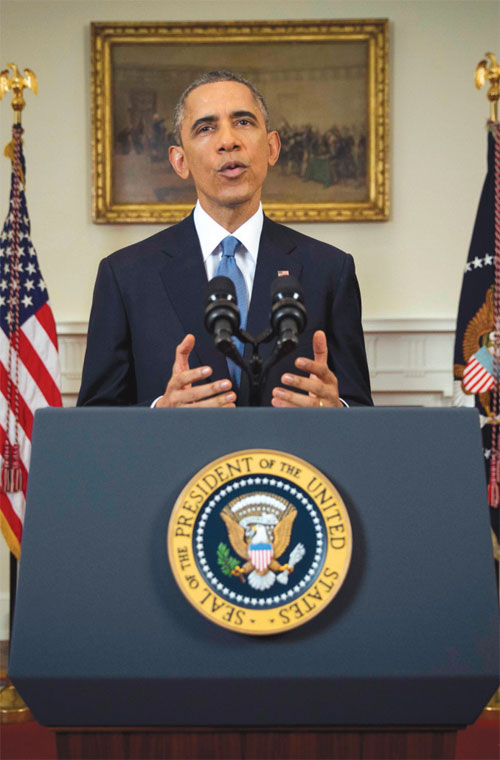New dynamic for US, Cuba




China could see some economic shifts in Latin America: experts
For China, the restoration of diplomatic relations between the United States and Cuba will bring both opportunities and challenges, experts said.
US President Barack Obama's historic announcement Wednesday to restore diplomatic relations with Cuba - ending more than five decades of estrangement between the two countries - was hailed by Latin American-US experts, saying it is a practical move.
Speaking at the White House, Obama said the US will end "an outdated approach that for decades has failed to advance our interests".
"Instead we will begin to normalize relations between our two countries," said Obama, adding that it will "begin a new chapter among the nations of the Americas".
"Cuba has been used to depending hugely on importing products from China because of the trade embargo by the US," said Wu Guoping, a researcher at the Latin America Institute at the Chinese Academy of Social Sciences. "It may be changed as Cuba will face more options from the US alongside other Latin American countries opening up their markets to the country.
"In many aspects, China will face more competition and won't play the role of solo provider to Cuba," he added. "China can also expect more opportunities in the bilateral trades when the bars are lifted and Cuba show its potential in buying more things."
Zhou Zhiwei, a researcher with the Chinese Academy of Social Sciences Institution of Latin America Studies, said the US has paid a lot of attention to the Asia-Pacific area while losing its geopolitical advantages.
"With the rise of China and other BRICs countries, America's presence in Latin America is becoming less prominent," said Zhou. (BRIC stands for Brazil, Russia, India and China.)
China has replaced the US as the largest trading partner and investor in many Latin American countries, which makes the US move toward Cuba a practical one, Zhou noted.
"Not only is it a sign of ending Cold War hostility, but also a signal that the US will keep up its relations with its neighboring countries in Latin America," Zhou said.
Tao Wenzhao, a senior research fellow from the Institute of American Studies at the Chinese Academy of Social Sciences, said the new chapter of US-Cuba relations will be a legacy of the Obama administration.
With the influence of US and China - the world's two largest economies - in the Latin American region, the move will also create new dynamics among the US, China and Cuba on the economic front.
Zhou said China's presence in the Latin American region would possibly be affected by rising US influence.
"Big economies like US and China should conduct cooperation and avoid conflicts in the region," Zhou said.
Yuan Zheng, of the Chinese Academy of Social Sciences, noted that decades of US sanctions against Cuba have not lived up to expectations.
"Washington is shifting its strategy from boycotting to influencing Havana," Yuan said. He expressed doubt about the future of the Cuba policy change in the US Congress and said he is wondering if the initiative will survive opposition from Republicans.
Obama could seek some support from moderate Republicans, but "he has to make some concessions on other issues", Yuan said.
China is Cuba's second-largest trading partner after Venezuela. Two-way trade grew 7.9 percent to $1.879 billion last year, according to data from Chinese customs. China's exports of $1.374 billion to Cuba last year included refrigerators, buses, pickup trucks, power generators and other machinery products while Cuba's exports of $505 million to China were mainly nickel, sugar and other agricultural products.
Chinese President Xi Jinping visited Cuban revolutionary leader Fidel Castro in Havana, Cuba, during the last stop on his four-nation Latin American trip in July, where he praised Castro's efforts of promoting China-Cuba relations.
Wednesday's announcement came after Obama spoke with Cuban leader Raul Castro by telephone Tuesday, the first direct contact between the leaders of the two nations in more than 50 years.
Earlier Wednesday, Cuba released Alan Gross, an American subcontractor it had held in captivity in five years on humanitarian grounds. Obama said Gross's imprisonment had been an obstacle for the US to making major policy changes toward Cuba.
Obama said he had instructed Secretary of State John Kerry to initiate talks with Cuba on restoring diplomatic relations with the island country, which were severed in January 1961, and to review Cuba's designation as a state sponsor of terrorism. He added that the US will re-establish an embassy in Havana, the Cuban capital, and high-ranking officials will visit Cuba.
The US is also taking steps to increase travel, commerce and the flow of information to and from Cuba, said Obama, adding that he also looked forward to engaging Congress in discussion about lifting the embargo the US has imposed on Cuba.
US Secretary of Commerce PennyPritzker, who is attending 25thsession of the US-China Joint Commission on Commerce and Trade inChicago, said in a statement that the historic actions by Obama charts a new course for the two countries and their peoples.
"It will improve the lives of millions and will help spur long overdue economic and political reform across the country," Pritzker said."Expanding economic engagement between the Cuban people and the American business community will be a powerful catalyst that will strengthen human rights and the rule of law."
"The news is very positive," said United Nations Secretary General Ban Ki-moon. "I would like to thank President Barack Obama of the United States and President Raul Castro of Cuba for taking this very important step towards normalizing relations."
Xinhua and Chen Weihua in Chicago contributed to the story.
|
Doug Mills / Pool / Reuters |















